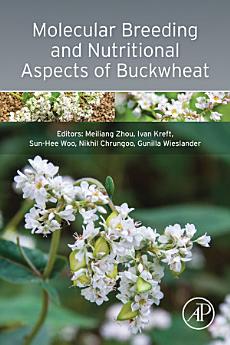Molecular Breeding and Nutritional Aspects of Buckwheat
Meiliang Zhou · Ivan Kreft · Sun-Hee Woo · Nikhil Chrungoo · Gunilla Wieslander
Jun 2016 · Academic Press
Ebook
482
Pages
family_home
Eligible
info
reportRatings and reviews aren’t verified Learn More
About this ebook
Molecular Breeding and Nutritional Aspects of Buckwheat describes the general characterization and genetic diversity of buckwheat (family Polygonaceae, genus Fagopyrum) around the globe (especially in Russia, China, India, and Eastern Europe), the arid and cool regions where it is most frequently consumed, and nutritional information on a variety of buckwheat uses, including tea, groats, flour, and noodles. With detailed information on buckwheat regeneration, genetic transformation, gene function analysis, and the metabolic engineering of bioactive compounds, the book guides readers through a variety of buckwheat varietal adaptations, providing foundation information on which additional research should be conducted. It is divided into four parts, including genetic resource and phylogenetic relationship, food nutrition, growth and cultivation, and molecular breeding, with each section providing insights into the most current developments. - Addresses all aspects of buckwheat research, including genetic resources, biological nutrition, genetic transformation, and molecular breeding - Presents global characterization on the genetic resource of Fagopyrum, giving researchers insights that will help them breed new cultivars - Explores the bioactivity of buckwheat - Includes detailed information on the environmental factors that affect the growth and production of buckwheat
About the author
Dr. Meiliang Zhou (Biotechnology Research Institute-CAAS/Sichuan Agricultural University, China), Regulation of gene expression; Plant development; Functional genomics; Hormones signaling transduction mechanisms; Plant-biotic (microbe, insect and virus) interaction; Plant-abiotic (drought, salt, flooding, heavy metals, cold and high temperature); Plant secondary metabolites biosynthesis pathway and regulation mechanism; Plant nutrition.Prof. Dr. Ivan Kreft (University of Ljubljana/Slovenian Forestry Institute, Slovenia)studied agronomy and biology in Ljubljana (Slovenia - Dipl. Eng. Agr., Teacher of Biol., PhD) and in Lund (Sweden - Fil. Kand., MSc.). After employments in Germany and Sweden, he was appointed as researcher and teacher at University of Ljubljana, where he was retired as Professor in 2012. Since 2003 he is a member of Slovenian Academy of Science and Arts. He was holding lectures at many Universities including Maribor, Križevci, Zagreb, Wien, Udine, Roma, Lisboa, Porto, Lund, Uppsala, Nitra, Minsk, several Universities in China, in Korea, and on several Universities in Japan. In the period 1992/93 he was Visiting Professor at Kyoto University, Japan, in 2001 he received a title of Visiting Professor at Shanxi University (Taiyuan, China), in April and May 2010 he was again in Japan, Visiting Professor at Kobe Gakuin University, Faculty of Nutrition, in Kobe. Since 2013 he is employed at the Slovenian Forestry Institute, Ljubljana, Slovenia. Field research on crops, especially buckwheat, and traditional food materials of plant originProf. Dr. Sun-Hee Woo (Chungbuk National University, Korea), Research interests in Molecular Genetics and Breeding of Crops and Crop Functional Genomics and Proteomics . Awards: Award for Japanese Society of Breeding Best Research Presentation Award from the Korean Breeding Science Society Best Research Presentation Award from the International Plant Biotechnology Congress with J. of Plant Physiology Best Research Presentation Award from the Korean Crop Science Society Best Research Presentation Award from the Korean Plant Biotechnology Society Best Research Award from the Korean Biochemistry and Molecular Biology Society Excellent Paper Award, Korea Federation on Science & Technology SocietiesProf. Dr. Nikhil Chrungoo (North Eastern Hill University, India)Current Research Interests : Biodiversity profiling, Nutritional Genomics Important research activities: • A two locus barcode based on nucleotide sequences of cp rbcL and matK genes developed for identification of Chenopodium quinoa an important nutraceutical crop of Indian Himalayas. • Allelic forms of waxy locus of rice described for identifying varieties with altered amylose content of starch • A gene coding for a nutritionally rich seed storage protein from common buckwheat isolated. Accession no. AY245536 (EMBL) • Complete amino acid sequence of a lysine rich seed storage protein from grain of common buckwheat determined. Accession no. P83004 (SWISS PROT) • Granule bound starch synthetase (GBSS-I) isolated from buckwheat grains. • N-terminal amino acid sequence for 25 residues of GBSS-I of common buckwheat determined. Accession no. P84633 (SWISS PROT) • Cloned the promoter of 26 kDa lysine rich seed stiorage protein of common buckwheat Accession No. EU 595873
Rate this ebook
Tell us what you think.
Reading information
Smartphones and tablets
Install the Google Play Books app for Android and iPad/iPhone. It syncs automatically with your account and allows you to read online or offline wherever you are.
Laptops and computers
You can listen to audiobooks purchased on Google Play using your computer's web browser.
eReaders and other devices
To read on e-ink devices like Kobo eReaders, you'll need to download a file and transfer it to your device. Follow the detailed Help Center instructions to transfer the files to supported eReaders.




